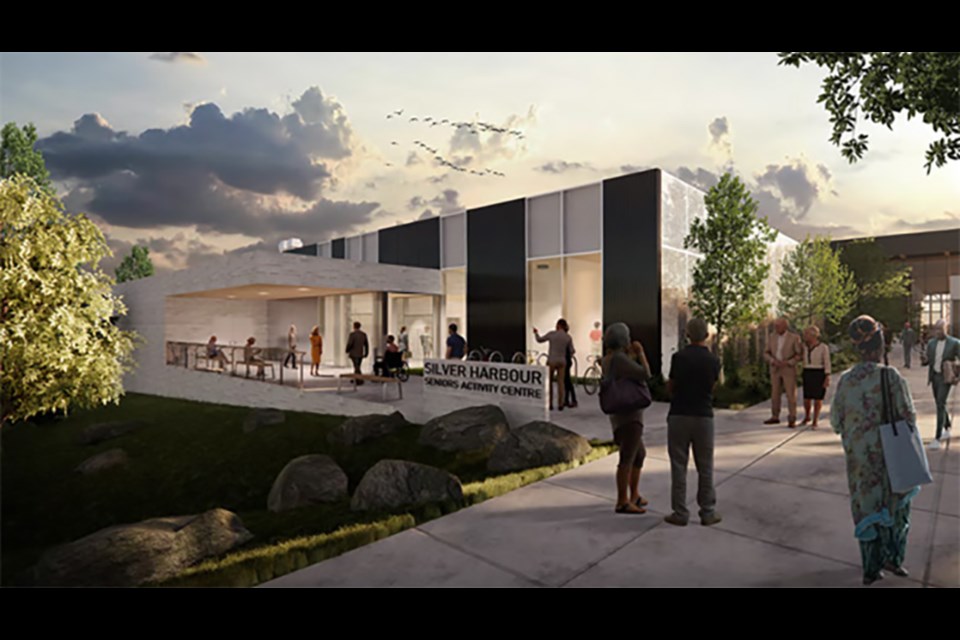In early July I had the privilege of attending a special event which celebrated the partnership between the City of North Vancouver and the Silver Harbour Seniors’ Activity Centre (SHC) to build a free-standing, independent centre for older adults.
The new building is being constructed on 23rd Street across from the old Harry Jerome site. The present SHC building is long past its best before date, so this will be a welcome upgrade, with the new building slated to be finished by the end of 2025.
Since the early planning stages of the new building, I have been encouraged that the city’s Mayor, Council and staff value the importance of a seniors’ centre to older people and the community in general, a value that I share as a senior.
This same value is highlighted in a new report released recently by Simon Fraser University authors, called Independent Seniors Centres: Connecting and Supporting Older Adults in Metro Vancouver. One of the main premises of the report, also strongly acknowledged by Mayor Buchanan at the celebration, is that “Seniors centres play a critical and vital role in the community and in the lives of older adults”.
Noting that there has been scarce research on seniors centres’ authors, Kadowaki, Wadman, Kupferschmidt and Wister and community partners say that more needs to be done to support their ongoing role in the community. They say “Seniors centres are inclusive spaces that foster social connections, empowerment, and a feeling of safety and dignity for older adults”.
The authors recommend sustainable funding so that seniors centres can “innovate, adapt and continue to effectively contribute to the health and well-being of older adults” (whose population is growing), build mutually beneficial research partnerships with seniors centres and academics to meet the challenges of the future, and provide ways to collectively advocate and take action.
The report, which began with a wide literature review based on Canadian and American sources, also relied on an analysis of participants input through focus groups.
Participants came from six independent seniors centres and these included board, volunteers and members and those who work with seniors.
The findings show that seniors centres are welcoming and inclusive spaces, sources of social connection and emotional support and places to interact with peers. They are empowering for older adults and have proven to be able to help them adapt to often difficult circumstances.
As an example of being able to adjust to adverse situations, the report discussed how seniors’ centres adapted to COVID-19, saying that “many seniors centres were able to quickly pivot, and through trial and error find meaningful and important ways to continue supporting their isolated members despite limitations”.
As an example here on the North Shore, seniors’ groups and organizations - through the support of the North Shore Seniors Working Group - found ways to pivot programs. These included extending virtual platforms for programming and services.
For example, the North Shore Keep Well Society, acknowledging that there is a place for dual types of programming, started and still runs an online Zoom exercise class.
Additional research has shown that programming offered by not only independent seniors centres, but also by community organizations who provide seniors programming, play a valuable role in older peoples’ lives.
There is a consensus that “aging in place” is the preferred community response to an increasingly aging population.
The community response is to provide places for seniors to congregate and get their needs met through strong and affordable programs and services.
On the North Shore, along with SHC, there are a wide variety of programs and services offered by North Shore Neighbourhood House, Parkgate Community Centre, West Vancouver Seniors’ Activity Centre, Capilano Community Services, Mollie Nie House and North Shore Volunteers for Seniors.
Also, there are organizations who support and encourage collaboration of those seniors groups, such as Lionsview Seniors’ Planning and North Shore Community Resources.
An outline of programs run by the seniors centres and other organizations supporting seniors strongly reflects the programming that the focus groups referred to in the SFU report.
The programs outlined in the report include: those with social, creative arts, recreational, educational and skill building components, and services include supportive, health, and food offerings.
It is widely recognized in the community and as discussed in the SFU report, that for seniors’ programming to be successful there has to be good supports and adequate funding.
Supports could include core government funding; strategic partners such as businesses, civic organizations, provincial government departments, academics, and faith communities and well-run volunteer programs.
These programs also require adequate space for standard and alternative programming.
In North Vancouver, it is great to see the partnership between the City and Silver Harbour in producing a wonderful resource for seniors. We need more of those partnerships both here at home and in Metro Vancouver.
Margaret Coates is the co-ordinator of Lionsview Seniors’ Planning Society. She has lived on the North Shore for 53 years and has worked for and with seniors for twenty-Eight of those years. Ideas for future columns are welcome – email [email protected].



